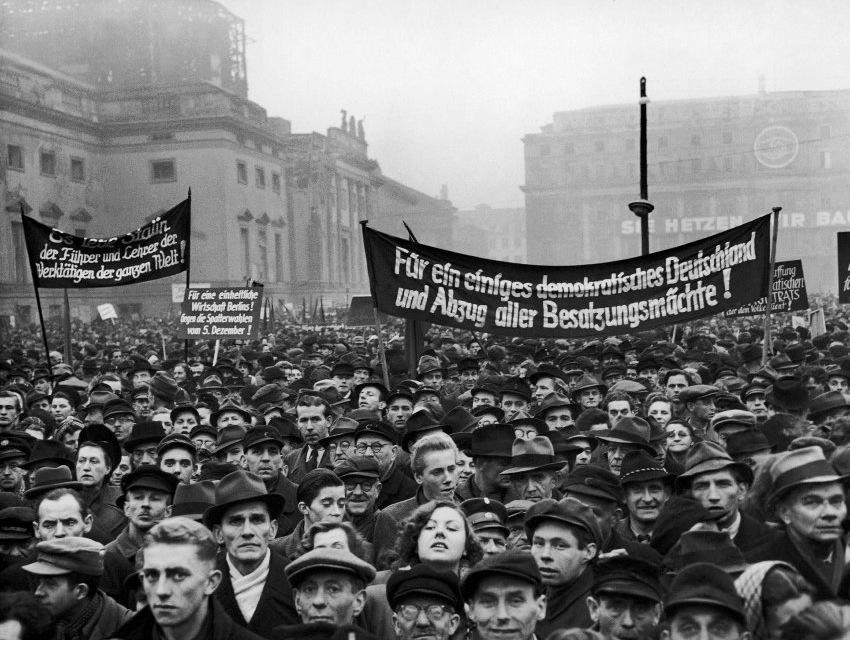TOWARDS THE ESCS

Protest in East Germany against the three power (US, UK, France) occupation of the Ruhr
Milward is insistent that the OEEC had nothing to do with the emergence of the European Coal and Steel Community (ESCS), which is usually seen as the beginnings of European integration but which he describes (p.217) as 'an assertion of European economic and political will as a reaction against American policy.' It was in fact the continuation of the Monnet Plan with its need for access to coking coal (the only coal suitable for steel production) from the Ruhr. In the integrated United States of Europe envisaged by the Americans, each country would concentrate on its own specialisation in relation to a single coherent entity. The European nations, however, particularly, in their different ways, Britain and France, wanted so far as possible to have their own complete economies and their own distinct mode of political organisation - the British Welfare State being a conspicuous example. Marshall Aid in the end helped this project, not the US project: 'Ironically the success of Marshall Aid was itself a major obstacle to the implementation of American policy' (Milward, p.210).
The Americans had been critical of the Monnet Plan, wanting France to concentrate much more on the immediate satisfaction of consumer demand, food and housing, with a view to forestalling the discontent that was fuelling support for the Communist Party. (5) From the American point of view in an integrated Europe if Germany could produce a surplus of steel there was no need for other countries to do likewise.
(5) See eg Irwin M.Wall, Philippe-Etienne Raviart: 'Jean Monnet, les États Unis et le plan français', Vintgième Siècle, Revue d'histoire, No 30, April-June 1991, pp.9-10.
France had pressed hard for the establishment of an international authority for the Ruhr. The future of the Ruhr was discussed at length in a conference held in London in 1948 and something like the desired authority was agreed but, says Milward (pp.153-4) 'few bodies can have been argued about for so long which in the end did so little. Its historical importance lay precisely in that, because its powers were so inadequate as to be capable only of producing ill-will, it paved the way for the European Coal and Steel Community.'
The principle was that 'access to the coal, coke and steel of the Ruhr, which was previously subject to the exclusive control of Germany, be in future guaranteed without discrimination to the countries of Europe co-operating in the common good' (p.154). But this flew in the face of the determination of the US military in charge in the US/UK bizone to restore full German sovereignty as a counterweight to the Soviet Union and as a motor power for the European economy as a whole. No sooner was the 'international authority' gained than the substance of it was whipped away:
'By the end of May 1948, it had become certain that the second stage of the London conference would recommend a West Germany with a more unitary constitution than France considered acceptable and an International Authority for the Ruhr with neither the powers nor the duration which France considered indispensable. The inevitable moment of choice had arrived. The choice had not been imposed on France by acceptance of the Marshall Plan. Within the CEEC France had been able to rely on British support against all American attempts to force political integration on to Western Europe and even on a certain measure of British support for the idea that German economic recovery should be slower than that of the rest of Western Europe. But in the London conference there was no British support for French views on the German constitution. Indeed, it was made clear to the French that if the National Assembly rejected the proposals for the German constitution and the Ruhr Authority as they had emerged from this stage of the London conference the United States and Britain would still go ahead by themselves with their own version of a future Germany.' (pp.157-8)
The French had to accept this conclusion because 'Not to accept would have been to end almost all French influence over the future Germany save that exercised in the French zone of occupation' which, especially since the coal-rich Saarland had already been incorporated into France, would be nothing but a burden.
'The conclusion from such an unavoidable analysis was only a short step logically; in terms of Europe's future organisation it was a giant's pace. If, faced with this defeat, what France sought in Germany was influence over the future society there and access to the Ruhr resources, these could only be achieved by a closer Franco-West German political association and economic co-operation. From the time the decisions of the second stage of the London conference had to be accepted or refused there began a determined search in Paris for an entirely different solution, and now the only logical one, to the problem of Franco-German relations.' (p.158)